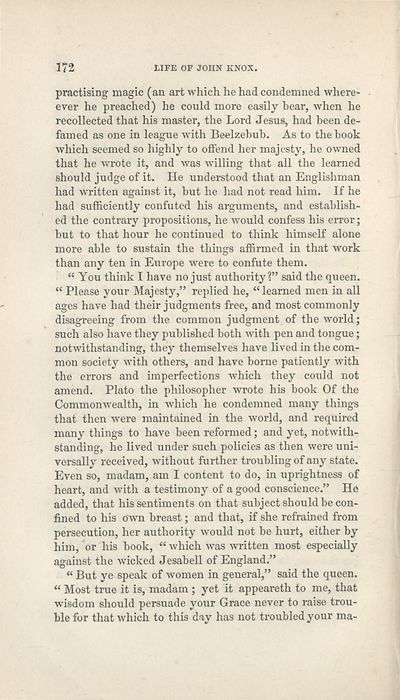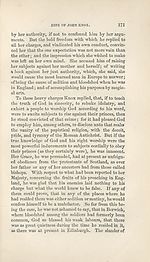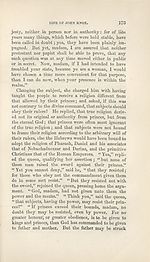Download files
Complete book:
Individual page:
Thumbnail gallery: Grid view | List view

172
LIFE OF JOHN KNOX.
practising magic (an art which he had condemned where-
ever he preached) he could more easily hear, when he
recollected that his master, the Lord Jesus, had been de¬
famed as one in league with Beelzebub. As to the book
which seemed so highly to offend her majesty, he owned
that he wrote it, and was willing that all the learned
should judge of it. He understood that an Englishman
had written against it, hut he had not read him. If he
had sufficiently confuted his arguments, and establish¬
ed the contrary propositions, he would confess his error;
but to that hour he continued to think himself alone
more able to sustain the things affirmed in that work
than any ten in Europe were to confute them.
“ You think I have no just authority?” said the queen.
“ Please your Majesty,” replied he, “ learned men in all
ages have had their judgments free, and most commonly
disagreeing from the common judgment of the world;
such also have they published both with pen and tongue;
notwithstanding, they themselves have lived in the com¬
mon society with others, and have borne patiently with
the errors and imperfections which they could not
amend. Plato the philosopher wrote his book Of the
Commonwealth, in which he condemned many things
that then were maintained in the world, and required
many things to have been reformed; and yet, notwith¬
standing, he lived under such policies as then were uni¬
versally received, without further troubling of any state.
Even so, madam, am I content to do, in uprightness of
heart, and with a testimony of a good conscience.” He
added, that his sentiments on that subject should be con¬
fined to his own breast; and that, if she refrained from
persecution, her authority would not be hurt, either by
him, or his book, “ which was written most especially
against the wicked Jesabell of England.”
“ But ye speak of women in general,” said the queen.
“ Most true it is, madam ; yet it appeareth to me, that
wisdom should persuade your Grace never to raise trou¬
ble for that which to this day has not troubled your ma-
LIFE OF JOHN KNOX.
practising magic (an art which he had condemned where-
ever he preached) he could more easily hear, when he
recollected that his master, the Lord Jesus, had been de¬
famed as one in league with Beelzebub. As to the book
which seemed so highly to offend her majesty, he owned
that he wrote it, and was willing that all the learned
should judge of it. He understood that an Englishman
had written against it, hut he had not read him. If he
had sufficiently confuted his arguments, and establish¬
ed the contrary propositions, he would confess his error;
but to that hour he continued to think himself alone
more able to sustain the things affirmed in that work
than any ten in Europe were to confute them.
“ You think I have no just authority?” said the queen.
“ Please your Majesty,” replied he, “ learned men in all
ages have had their judgments free, and most commonly
disagreeing from the common judgment of the world;
such also have they published both with pen and tongue;
notwithstanding, they themselves have lived in the com¬
mon society with others, and have borne patiently with
the errors and imperfections which they could not
amend. Plato the philosopher wrote his book Of the
Commonwealth, in which he condemned many things
that then were maintained in the world, and required
many things to have been reformed; and yet, notwith¬
standing, he lived under such policies as then were uni¬
versally received, without further troubling of any state.
Even so, madam, am I content to do, in uprightness of
heart, and with a testimony of a good conscience.” He
added, that his sentiments on that subject should be con¬
fined to his own breast; and that, if she refrained from
persecution, her authority would not be hurt, either by
him, or his book, “ which was written most especially
against the wicked Jesabell of England.”
“ But ye speak of women in general,” said the queen.
“ Most true it is, madam ; yet it appeareth to me, that
wisdom should persuade your Grace never to raise trou¬
ble for that which to this day has not troubled your ma-
Set display mode to:
![]() Universal Viewer |
Universal Viewer | ![]() Mirador |
Large image | Transcription
Mirador |
Large image | Transcription
| Antiquarian books of Scotland > Scotland/Scots > Life of John Knox ; and, The life of Alexander Henderson > (190) |
|---|
| Permanent URL | https://digital.nls.uk/131834584 |
|---|
| Description | Thousands of printed books from the Antiquarian Books of Scotland collection which dates from 1641 to the 1980s. The collection consists of 14,800 books which were published in Scotland or have a Scottish connection, e.g. through the author, printer or owner. Subjects covered include sport, education, diseases, adventure, occupations, Jacobites, politics and religion. Among the 29 languages represented are English, Gaelic, Italian, French, Russian and Swedish. |
|---|

